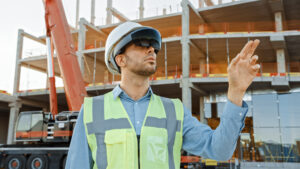RIIS is an industry and ARC funded research and innovation hub for smart infrastructure. It engages with industry, government, and the community to develop and implement science-based policy and integrated practical solutions to the current and future challenges facing Australia’s urban, resource and energy infrastructure.
Aim
 RIIS will deliver transformational technologies to address Australia’s critical infrastructure needs. It will integrate advances in sensor technology, connectivity, data analytics, machine learning, robotics, smart materials, and reliable models to deliver resilient and adaptive infrastructure systems in urban, energy and resource sectors – sectors critical to Australia’s prosperity and well-being.
RIIS will deliver transformational technologies to address Australia’s critical infrastructure needs. It will integrate advances in sensor technology, connectivity, data analytics, machine learning, robotics, smart materials, and reliable models to deliver resilient and adaptive infrastructure systems in urban, energy and resource sectors – sectors critical to Australia’s prosperity and well-being.
The Hub will provide opportunities for industry and university partners to develop, co-design, develop, and enhance technologies suitable for safe and sustainable operations, further enhancing the resilience and intelligent capability of existing and new infrastructure, transportation networks, distribution systems, minerals and energy sectors, and other hard infrastructure.
Background
 Critical surface and subsurface infrastructure and physical assets such as buildings, roads, bridges, rail lines, tunnels, utilities, processing plants, refineries as well as resource industries form the backbone of Australia’s productivity. Yet, according to the Australian Infrastructure Audit (2015) most infrastructure used in 2030 will be in a substandard state of repair, well below par with other OECD nations. With demand for new infrastructure in all sectors for our growing population, combined with impacts of climate change and aging infrastructure, there is an increasing need for new technologies to predict infrastructure rehabilitation and renewal needs, pre-empt failure and prolong life as well as new systems to deliver sustainable, resilient, and cost-effective infrastructure. RIIS will leverage a suite of innovative and integrated technologies to monitor, model and improve our urban infrastructure, transport, water, resource, and energy management in order to achieve economic, sustainable and low-carbon development.
Critical surface and subsurface infrastructure and physical assets such as buildings, roads, bridges, rail lines, tunnels, utilities, processing plants, refineries as well as resource industries form the backbone of Australia’s productivity. Yet, according to the Australian Infrastructure Audit (2015) most infrastructure used in 2030 will be in a substandard state of repair, well below par with other OECD nations. With demand for new infrastructure in all sectors for our growing population, combined with impacts of climate change and aging infrastructure, there is an increasing need for new technologies to predict infrastructure rehabilitation and renewal needs, pre-empt failure and prolong life as well as new systems to deliver sustainable, resilient, and cost-effective infrastructure. RIIS will leverage a suite of innovative and integrated technologies to monitor, model and improve our urban infrastructure, transport, water, resource, and energy management in order to achieve economic, sustainable and low-carbon development.
Deliverables

RIIS will engage with industry, government, and the community to unlock scientific roadblocks, deliver foundational skills for industry professionals and researchers, and translate research and development into real-world commercial opportunities
- DELIVER the next generation of sustainable technologies for design, real-time performance analysis and life-management of Australia’s critical infrastructure in urban, energy and resources sectors.
- SOLVE current industry challenges and translate research and development into commercial opportunities.
- DESIGN novel and powerful health-monitoring technologies including non-destructive, non-contact dynamic diagnostic systems for asset protection.
- ENABLE creating a collaborative environment for government, industry, and academia to testbed the innovative ideas and support the government for a data-driven and evidence-based decisions and strategies
- DEVELOP Australia’s next generation of fully validated robust, commercially viable, digital technologies for design and delivery of the nation’s hard infrastructure to achieve competitiveness in domestic and export markets.
- LEVERAGE technologies in IoT and robotics, autonomous systems, big data, and high-level computing to build fit-forpurpose mobility platforms to cope with tasks in structured and unstructured environments, particularly assets located in remote region
- TRAIN a cohort of highly competent and motivated young professionals through research and development programs carried out in partnership with participants from all sectors of the infrastructure industry
- ASSIST in creating a cohesive innovative technical skills supply chain to address the future technological requirements of the industry, with improved planning, decision making and safe operations and resiliency
- DISSEMINATE discoveries and advances in technology and facilitate adoption through effective engagement with the engineering partner organisations, peak bodies, businesses, stakeholders and broader engineering and scientific communities.